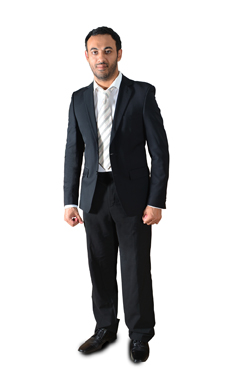What makes an entrepreneur? Interview with Qais Al Khonji from Oman
By Annemarie Robson – International Editor – Middle East Business
According to PwC, a global consultancy, over 80% of businesses in the Middle East and Arab countries are either owned or controlled by families who began as entrepreneurs or business owners.
Fortunately, 70% of these businesses survive to the next generation according to other sources. But what about the second generation? Is there the same willingness to have their own business adventure?
It seems an opportune time to talk to two people who’ve already been through the process and found success as entrepreneurs. We’re honoured to have spoken recently with two exceptional examples: Qais Al Khonji, Omani entrepreneur, and Baybars Altuntaş, Turkish entrepreneur, business angel and Dragon’s Den star.
Qais Al Khonji is an Omani businessman and entrepreneur. He is the founder of Qais United Enterprises Trading and Genesis International. He serves as a board member for many Omani companies and is known for assisting Omani citizens overcome the hurdles of starting a small business in the country.
- Genesis International – Higher education (medical) and solar energy
- Genesis Projects and Investment – Core testing lab for oil and gas sector
- Genesis Manufacturing – Manufacturing equipment for laboratories
- Genesis Communications – Presently working with a Spanish partner to implement a “smart city”, enabling inhabitants to pay utility bills automatically.
Can we start at the beginning: when did you first become interested in starting your own company?
Back in 2009, when I was still working in corporate banking, I decided that I was an entrepreneur. I’m a risk taker. I was willing to wait and learn. I thought I had the qualities to become an entrepreneur. I made mistakes in my first company that I believe, ultimately, have led to my current success. I’m enjoying the experience. I’m enjoying the daily challenges that are taking me closer to my ultimate goal. I have a plan to go global and I’m working hard to achieve this.
Did you see a gap in the market and decide only you could effectively fill it?
I belong to a family business, the Al Khonji Group, which has been around since the 1920s. Even though I’m part of its board, I’ve always believed that it’s a good idea for me to have a “project”.
Other than learning the hard way, it also allows me to enjoy making decisions independently, unlike with the family business where every decision is sensitive to investments or share price. This is one of the reasons why I have decided to prove myself by finding success independently.
What experience did you build upon?
My first business didn’t take off – however, it was a great learning platform.
I imported goods from China that weren’t available in our local market which taught me many lessons, most importantly that it’s better to start your business in the service sector, not in products.
It is really important to focus on marketing techniques, especially when operating in a small market, so as to reach your target clients. Otherwise you won’t sell anything.
Sometimes when an entrepreneur starts his or her project there is a lot of passion, but the reality turns out to be very different from the dream. It’s not as easy as you think it will be and you need to have lots of patience – and believe in your idea 100%.
In an article in our launch issue, “Where‘s the best place in the world to do business?“, Oman didn‘t rank very highly as a place to start a new business. What is your experience to date?
I kind of agree that it might not be the easiest place to set up and start a business. But despite that, it’s my hometown, and I want to have a base in my own hometown before I continue towards my dream of going global. I’m in the process of establishing a few “cash cows”* in my hometown so I can invest in the international market one day.
I call the Omani market, the market of the 2 S’s. It’s slow and small. Slow when it comes to executing an order which is a cost factor which could lead to minimising the survival lifetime of the start-up. And small, with a total population of 3 million and a capital city home to one million people, making it too small to be able to survive unless your business idea is very unique.
As a magazine that proactively supports women in business, do you encounter many women entrepreneurs in Oman?
We have many successful entrepreneurial projects in Muscat that are run by women, Such as Gloria Jeans Cafe, G Cafe and Proshots. The government is encouraging entrepreneurship – it would be a great idea to include lessons about it in our compulsory education system, perhaps at grades 10 to 12, so as to give youngsters a good grounding in how they can start their own business.
Can you give our readers an overview of how you became a successful entrepreneur?
I have started five companies during the past few years. My first company didn’t take off, as mentioned previously, and I think my current success has a lot to do with that first experience of failure.
What advice would you offer to others who want to start up their own business?
- Start your business in the service sector
- The best projects consist of an engineer and a finance person as partners
- Be patient and believe in your idea
- List your goals and work towards them
- Keep on practicing and learn through your actions
- Take some cash flow/bookkeeping courses
- Do what you enjoy doing
*Cash cow – a business venture that generates a steady return of profits that far exceed the outlay of cash required to acquire / start it.














